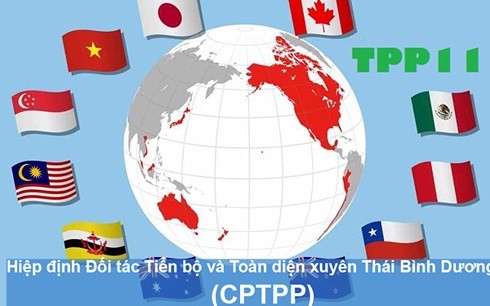(VOVWORLD) - Although the US withdrew from the Trans-Pacific Partnership agreement, ministers of 11 TPP members reached a consensus at APEC Week 2017 In November on a new TPP deal and called it the Comprehensive and Progressive Agreement for Trans-Pacific Partnership (CPTPP). Vietnam expects to benefit a lot from the new agreement once it takes effect.
 (Photo: Internet) (Photo: Internet) |
The Comprehensive and Progressive Agreement for Trans-Pacific Partnership (CPTPP) will benefit Vietnam not as much as the original agreement, but economists say the new deal will open up great opportunities for Vietnam to cooperate with the world’s leading economies.
It can, for example, expand export markets with Canada, Mexico, Peru, and Chile, with whom Vietnam has not signed trade agreements. Vietnam’s exports of garments and textiles, leather and food wear, and several other labor-intensive industries will likely to increase.
Nguyen Dinh Cung, Director of the Central Institute for Economic Management, said: “It’s obvious that without the US there will be fewer advantages. But Vietnam still can penetrate major markets like Japan, its 5th biggest trading partner and 3rd biggest investor, and Australia, a potentially strong market for Vietnam’s farm produce.”
The CPTPP agreement is a highly standardized deal in terms of institutions, state management quality, and legal framework. Economist Vo Tri Thanh says the deal will be advantageous for a state governed by law with a transparent investment and business environment and a driving force for development.
“20 of about 50 clauses of the initial TPP agreement are temporarily frozen. Under the CPTPP agreement, quality must be ensured and attached to the reform of institutions and policies, the most important factors in boosting growth quality and promoting inclusive growth,” Thanh said.
The TPP is estimated to cover 40% of world GDP and 30% of global trade, the CPTPP will cover only 14% of world GDP and 17% of global trade. But the challenges Vietnam will face will be the same, according to economists and the business community.
Nguyen Van Can, Head of the Research and Development Section of Corporation 28, says: “Tax reduction will enable goods of other countries to flood Vietnam, thus creating greater competitiveness in the domestic market. The second challenge is the labor force. If more investment flows to Vietnam, trading and cooperation with other countries will expand and it will be harder for Vietnamese businesses to attract or keep workers.”
Vietnamese businesses need to prepare human resources and increase skill training, particularly in IT, to take advantages of the new agreement.